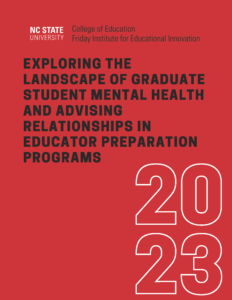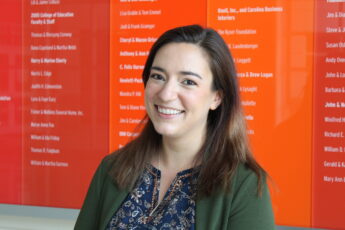Exploring the Landscape of Graduate Student Mental Health and Advising Relationships in Educator Preparation Programs
Executive Summary
Importance of the Research
The upcoming generation of professionals are experiencing more severe anxiety, depression, and psychological distress at higher rates than older generations, and graduate students are at an increased risk for mental health concerns (Bernstein,LeBlanc, Bentley, Barreira, & McNally, 2021). One of the more common mental health concerns in graduate students associated with anxiety and burnout is the impostor phenomenon (IP). While IP is prevalent among graduate students, rates among racial, ethnic, and gender minority groups are even higher (Leach, Nygaard, Chipman, Brunsvold, & Marek,2018; Cohen & McConnell, 2019; Wang, Sheveleva, & Permyakova, 2019). Some researchers have even suggested that the academic culture can generate feelings of impostorism, through colleagues questioning expertise, the pressure to publish and produce research, the comparison with other colleagues, and the inability to internalize feelings of success(Hutchins & Rainbolt, 2017).
Researchers Cohen and McConnell (2019) examined graduate school program environments and the factors that contributed to greater or lesser feelings of impostorism in students. They found that perceptions of high-quality mentorship and reports of decreased competition and isolation corresponded with less frequent impostor fears in graduate students (Cohen &McConnell, 2019). The current research study seeks to expand upon this research by focusing on graduate students in education-related fields to further understand the interactions between the quality of mentoring relationships and feelings of anxiety and impostorism. The study places special emphasis on racially and ethnically diverse graduate students, who often face compounded stressors in the academic environment.
Research Questions
This study is the first phase in understanding how anxiety in graduate students, quality of mentorship, and a focus (or lack thereof) on mental health within programs affects graduate student feelings of competence, quality of work, and time to graduation. The results from Phase I will guide the assessment of training programs for faculty at NC State to build more meaningful mentoring relationships with students and teach faculty about the implications of mental health on graduate student success. The research study held four primary hypotheses:
- Graduate students who have more diverse mentoring and advising relationships will have lower rates of anxiety and feelings of impostorism when compared with students who do not have strong mentoring and advising relationships.
- Graduate students who report that their advisor/mentor talks to them about the importance of mental health will have lower rates of anxiety, feelings of impostorism, and burnout than graduate students who do not indicate that their advisor talks with them about mental health concerns.
- Women and gender non-conforming individuals in graduate training programs will have higher ratings of anxiety and feelings of impostorism than their cisgender male counterparts.
- Racially and ethnically diverse graduate students will have higher ratings of anxiety and feelings of impostorism than their white counterparts.
Key Quantitative Findings
One hundred twenty graduate students participated in the research study. The findings from the study highlight that graduate students enrolled in educator preparation programs are experiencing anxiety and they desire systemic change to promote a more inclusive graduate program experience. Graduate students’ relationships with their advisor appear to have an effect on their anxiety, and participants reported qualitatively there is room for growth in how their advisors provide them with support.
Graduate students report lower feelings of impostorism and anxiety when they align with their advisors’ research identity. Results indicate that graduate students who have a greater sense of rapport with their advisor have lower rates of anxiety. Additionally, when graduate students have higher feelings of theoretical alignment with their advisor, they report lower ratings of impostorism and anxiety. The results align with Cohen and McConnell’s (2019) findings that perceptions of high-quality mentorship correspond with less frequent impostor fears.
There was not a significant relationship between race and anxiety and impostorism. However, there were no significant differences between participant-reported race and feelings of anxiety, nor between race and impostorism. These findings support Nadal et al.’s(2021) research theorizing that having a strong racial identity can serve as a protective factor against impostorism and anxiety and future research should further explore racial identity and impostorism in academia.
Graduate students who reported having more caring and understanding advisors did not report lower feelings of impostorism or anxiety. There was not enough quantitative evidence to support a relationship between the caring subscale on the AWAI and feelings of impostorism and anxiety. These results are in contrast to previous research by Cohen and McConnell (2019) and Cowie et al.(2018), and future research should examine the factors that affect the quality of mentoring relationships and training of mentors and graduate advisors.
Women and gender non-conforming graduate students did not report higher ratings of anxiety or impostorism. This does not support previous research from Cowie and colleagues (2018) or research from Wang, Sheveleva, and Permyakova (2019). Previous research has identified that women and gender minority individuals demonstrate more vulnerability to academic stress and feelings of impostorism. As education is typically a field dominated by women, perhaps women-identifying graduate students feel a greater sense of belonging and therefore do not exhibit greater feelings of anxiety or impostorism than men.
Key Qualitative Findings
Advisors provide graduate students with a variety of support. Participants responded that their advisor provides them with encouragement, feedback on written work, research, academic, and professional support. The most frequently reported type of emotional support graduate students noted was “encouragement.”
Faculty advisors are not clear in their feedback nor accessible to their students. Individuals reported they would appreciate more guidance and direction from their advisors. They also noted they wish their advisors were more open to their ideas and more encouraging. Graduate students wished their advisor was more proactive in reaching out to schedule meetings, had more meetings, and be more responsive to email communication. This feedback was echoed not only for academic progression through programming but also for supporting graduate students’ mental health as well.
Graduate student participants want more structure, supervision, and clearer expectations from their advisors. Participants reported feeling misunderstood and lacking fundamental knowledge about program requirements. One participant noted they would like their advisor to “Actually advise me on the tasks of completing graduation research requirements, since I am unfamiliar with that process.”
Graduate students find support in others. The most common sources of support were found in others, with graduate students reporting finding support in colleagues in their program most frequently, followed by family, friends, and their partner(s). Graduate students also noted finding support in mentors, who were sometimes identified as their advisor but at other times were identified as other faculty.
Self-care is discussed in programming but is not a priority. Programmatically, the most common response from graduate students was that self-care is “discussed” by professors, in emails, or in general messaging. However, almost as many responses indicated that self-care is not prioritized or discussed. The ways that graduate students were able to identify that self-care was promoted was through wellness days and individual professors’ efforts, whether through discussions in class or flexibility with assignment due dates.
Summary, Recommendations and Next Steps
This research marks the first step in understanding the needs graduate students identify as part of their programs. Graduate students identified needing more support from their advisors. Participants also recognized the need for programs to make more concerted efforts to promote self-care and address biases that uphold systemic racism.
Graduate students should take advantage of NCSU Counseling Center resources. The Counseling Center offers group counseling, teletherapy, off-campus referrals, and workshops. The Counseling Center website also contains a central hub for mental health resources for African American, Asian American, and Native American students in addition to their resource lists for LGBTQIA+students and disability support.
Graduate students should practice expectation-setting with faculty advisors. Graduate students may consider creating a resource to share with their advisors on expectations they have as graduate students. These expectations may include a schedule of meetings, how they like to give and receive feedback, and what kinds of support they expect from their advisor (e.g., moral support, support with networking). The university may consider providing training to allow members of the community the opportunity to strengthen their skills in self-advocacy.
Graduate students should build community within programs. Graduate students report better mental health and academic outcomes when they feel like they have a sense of community (Cohen & McConnell, 2019). Responses from the current study echo this finding, as many participants noted they find support in their colleagues. Graduate students may consider formalizing their communities through student groups and marketing these groups to both full- and part-time students. These communities can provide a space for individuals to share resources, as well as provide an opportunity for collaboration or commiseration.
The University should provide clarity around wellness days. Participants noted that the wellness days were away in which NCSU encouraged self-care. Participants also stated that the lack of clarity around the wellness days makes them more performative than helpful. The university should encourage a system of accountability to ensure that all NCSU community members feel empowered to practice self-care.
The University should train more faculty on recognizing symptoms of mental instability. NCSU offers the NC CARES student behavioral case management to provide comprehensive outreach, provide early intervention and behavioral assessments, and monitor student progress. NCSU may consider a more targeted marketing approach or incentive to encourage faculty to complete the training. Additionally, NCSU may consider offering more regular training or establishing a cohort model of practice for NC CARES and other programming to ensure faculty feel a sense of community in supporting their students.
The University should standardize expectations at the programmatic and departmental levels. Completing a graduate degree can feel isolating, in part due to the number of competing and ever-changing requirements within programs and departments. Departments should invest time into critically evaluating their degree requirements for both academic value and equity. Further, the university should continually assess the standards with which it evaluates the conferring of post-baccalaureate degrees to ensure that students are prepared with both the research and practical skills necessary to be successful in their chosen fields.
Direction of future research and efforts. This research highlights the first step in understanding the landscape of graduate student mental health and identifying key areas of improvement in advisor-advisee relationships. Next steps in the research include expanding the sample to include graduate students across disciplines. Additionally, the research team would like to evaluate the success of faculty training in reducing significant mental health concerns in the graduate student population. The research team is in the process of identifying funding sources to be able to continue this work to create lasting and systemic change in graduate student educational practices.
View Resource

Preferred Citation
Fischer, A. V. (2023). Exploring the landscape of graduate student mental health and advising relationships in educator preparation programs. North Carolina State University.
Authors
Contributors
Emily Waterfield
Undergraduate Research Assistant
